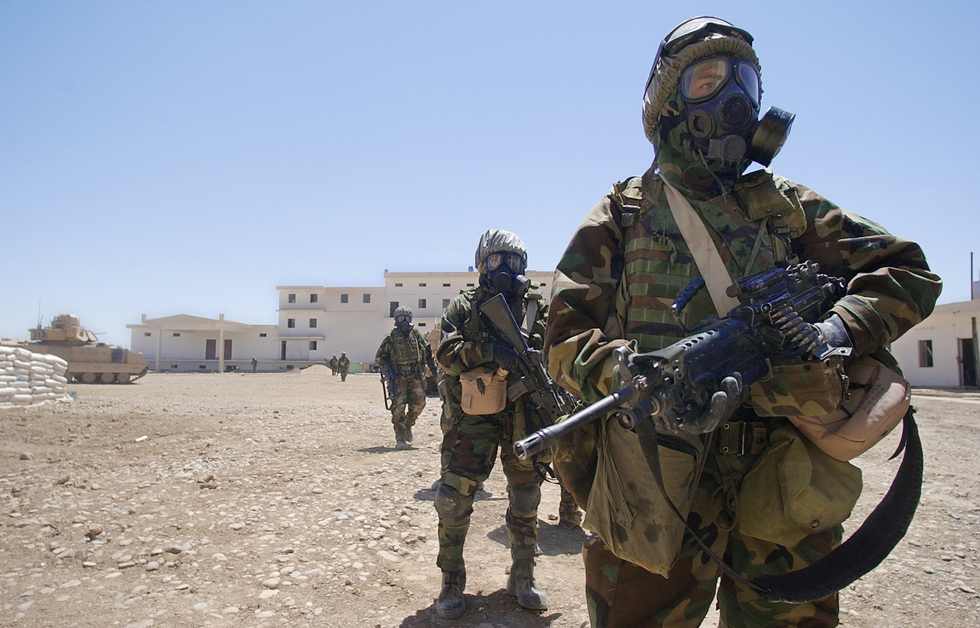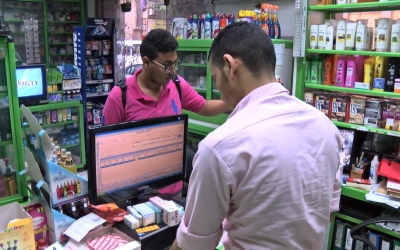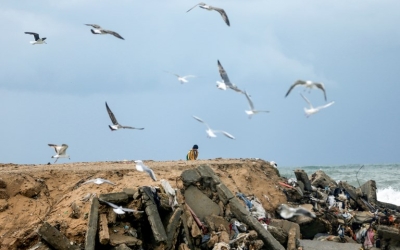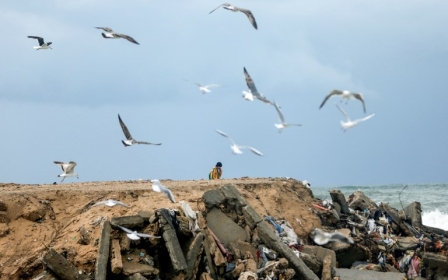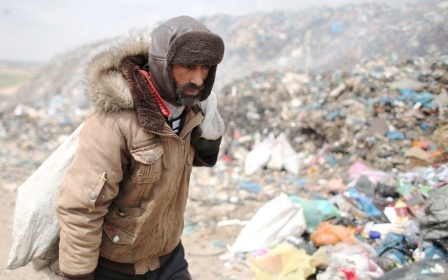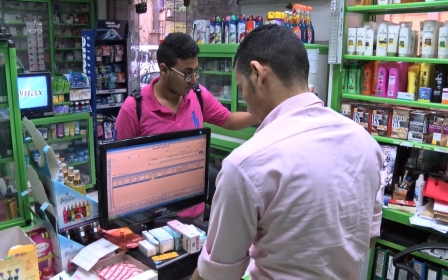The silent killer: Superbugs on the march in the Middle East

It's been described as being like a silent tsunami and at risk of putting medicine back in the Dark Ages.
Strains of superbugs resistant to a wide range of antibiotics are on the rampage across the Middle East and worldwide.
Karam Yaseen, formerly a nurse with Doctors Without Borders (MSF), now works as an advisor on antibiotic resistance at a post-operative care hospital set up by the charity in Mosul, northern Iraq.
'Antibiotic resistance is putting the achievements of modern medicine at risk'
- World Health Organisation
Soon after the hospital opened a year ago, staff began noticing a high level of antibiotic resistance among patients.
The Iraqi army retook Mosul in 2017, after a nearly nine-month-long offensive against Islamic State (IS).
New MEE newsletter: Jerusalem Dispatch
Sign up to get the latest insights and analysis on Israel-Palestine, alongside Turkey Unpacked and other MEE newsletters
"More than a year after the military offensive in Mosul, the consequences of antibiotic resistance are more striking and more visible than ever," Yaseen told Middle East Eye.
MSF says antibiotic resistance in Iraq and across the Middle East is alarmingly high. More than a third of the patients seen at the organisation's Mosul hospital are resistant to a wide range of drugs.
Unregulated use of antibiotics, bad hygiene and the general mayhem of war are some of the main causes of the superbug problem.
Rising costs of medical care and of drugs - as in Egypt - often encourages people to self medicate.
Cattle fed antibiotics to increase weight
Meanwhile, the widespread use and misuse of antibiotics in the animal population is also a significant factor, with cattle often fed the drugs to increase weight.
Antibiotics fed to animals enter the food chain and build up resistance to the drugs in humans.
"Fifteen years ago, the use of antibiotics [in Iraq] was fairly well regulated and we had a good medical system," says Yaseen.
"But the war in 2003 changed everything. After that, some antibiotics that require a prescription became very easily accessible on the market and people started to use them more, whenever they were sick.
"Now in Iraq, a pharmacist can sell you antibiotics, even the injectable ones, without a prescription."
Mosul might be considered to be a special case.
The city had been ravaged by a long occupation by IS and then by the prolonged siege.
Thousands died or were injured in the fight for the city, infrastructure was smashed, and peoples' health – both physical and mental – suffered severely.
But what is happening in Mosul is, in many ways, being replicated in other parts of the Middle East and in regions round the globe.
US soldiers consumed by 'Iraqibacter'
Antibiotic resistance is ranked up there with terrorism and climate change as among the greatest threats facing the world today.
For many decades, a range of antibiotics has stopped the spread of bacterial infections and, in the process, saved millions of lives and dramatically increased rates of life expectancy.
In recent years, however, antibiotics have shown signs of losing their effectiveness, particularly in the developing world; the medical alarm bells are ringing.
Though anti-bacterial resistance has been present in the Middle East for many years, it first came to be seen as a major problem in the region in 2003 when US soldiers injured in fighting in Afghanistan and Iraq were found to have developed multi-drug resistance.
Amputations had to be performed on legs when bacterial infections could not be treated, even with the most powerful drugs. One bug strain, Acinetobacter baumannii, became so common among soldiers it was nicknamed Iraqibacter.
The US military, with lavish amounts of medical resources available, was able to at least bring the problem under control.
But most governments in the Middle East do not have the means to adequately treat those with antibiotic resistance.
Analysing infections requires considerable expertise and large amounts of money.
A course of drugs, delivered intravenously, can cost several thousand dollars.
The MSF hospital in Mosul has special isolation areas where patients with such infections can be treated; counselling might also be needed for often severely traumatised victims of conflict.
Many health facilities in the region lack isolation units: some don't even have basic equipment like gloves.
In some cases, there are inadequate supplies of clean water and no proper sanitation. In such circumstances infections can be rapidly transmitted.
'Handing out antibiotics as if they are candy'
Dr Richard Murphy, now at the University of California, Los Angeles, worked for MSF on antibiotic resistance in Jordan.
"The Middle East, along with South Asia, is one of the global hotspots of antibiotic resistance - much of it due to overuse and often a complete lack of controls," says Murphy.
"We began to contain the overuse of antibiotics in hospitals in Amman but the real problem is in the wider community where there's an expectation that you'll be given drugs for a whole range of relatively minor ailments."
Studies carried out among Jordan's large Iraqi community found that many people obtained antibiotics from friends or relatives, or kept leftover tablets for use at other times.
One Jordanian physician says his country consumes three times the amount of antibiotics in one year as the UK, even though the population is only a sixth the size of Britain's.
"The true scale of the problem only really hit me when I saw the results of tests carried out on people attending outpatient clinics in Afghanistan," Murphy told MEE.
"These were generally healthy people with minor complaints yet the antibiotic resistance level among them was off the charts.
"They had been colonised by superbugs while outside in the community – one of the results of handing out antibiotics as if they are candy.
"If people do become really sick or have an injury there's nothing to treat them with and infections can easily be passed on.
"The situation across the Middle East is probably similar - it's not a question of things getting better, more of how fast it's getting worse,” says Murphy.
Gaza crisis
Several cases of antibiotic resistance have been reported in Gaza, one of the most densely populated areas on Earth where access to clean drinking water is severely limited and basic hygiene standards are often lacking.
Superbugs do not respect borders.
Raw sewage that might contain antibiotic resistant bugs is emptied into the Mediterranean from Gaza, and swept by tides onto beaches in Israel, or seeps down into an aquifer supplying water not only to Gaza but also to Egypt and Israel.
A worldwide review of the problem commissioned by the UK government, published in 2016, estimated that antibiotic resistant strains of bugs such as E.coli and Mycobacterium tuberculosis cause the deaths of 700,000 people each year, though the review suggests this is a low estimate.
That figure, says the study, could reach 10 million a year by mid-century.
Little profit for pharmaceutical companies
"Without urgent, coordinated action, the world is heading towards a post-antibiotic era in which common infections and minor injuries, which have been treatable for decades, can once again kill," says the World Health Organisation (WHO).
"Antibiotic resistance is putting the achievements of modern medicine at risk.
"Organ transplantations, chemotherapy and surgeries such as caesarean sections become much more dangerous without effective antibiotics for the prevention and treatment of infections."
What experts term novel drugs – entirely new antibiotics that bugs have not seen before – are urgently needed yet over the past quarter century they have failed to appear.
The development of such drugs demands considerable time and resources; pharmaceutical companies say they need tax breaks and other incentives to embark on complex research programmes.
If a radically new antibiotic was to be developed, WHO and other bodies would try to strictly limit its use in order to maintain its efficacy.
Drugs used only rarely are not attractive to pharmaceutical companies; more money is made developing long-term drugs for cancers and other diseases.
'Stupidity of mankind'
Tim Walsh is a professor at the school of medicine at Cardiff University in the UK and a world authority on antimicrobial resistance.
"Not only have we failed to develop novel new drugs but despite the scale of the problem there's still a lack of coordinated international action.
"Monitoring in hospitals and data collection in many regions is totally inadequate. Then there's the whole question of hygiene, of sanitation and of proper sewage disposal.
"If you have conflict, as in Syria, Libya or, worst of all, in Yemen, you really don't have a clue what's going on – the risk factors rapidly multiply."
Walsh says the internet has facilitated an unregulated antibiotics market.
Antibiotic resistance has also spread due to the multi-billion dollar medical tourism industry.
Many thousands of people in the Middle East journey to Thailand or India for operations each year: they might often pick up bugs and bring them home.
"The stupidity of mankind on this whole issue has been spectacular," says Walsh.
This article is available in French on Middle East Eye French edition.
Middle East Eye delivers independent and unrivalled coverage and analysis of the Middle East, North Africa and beyond. To learn more about republishing this content and the associated fees, please fill out this form. More about MEE can be found here.



